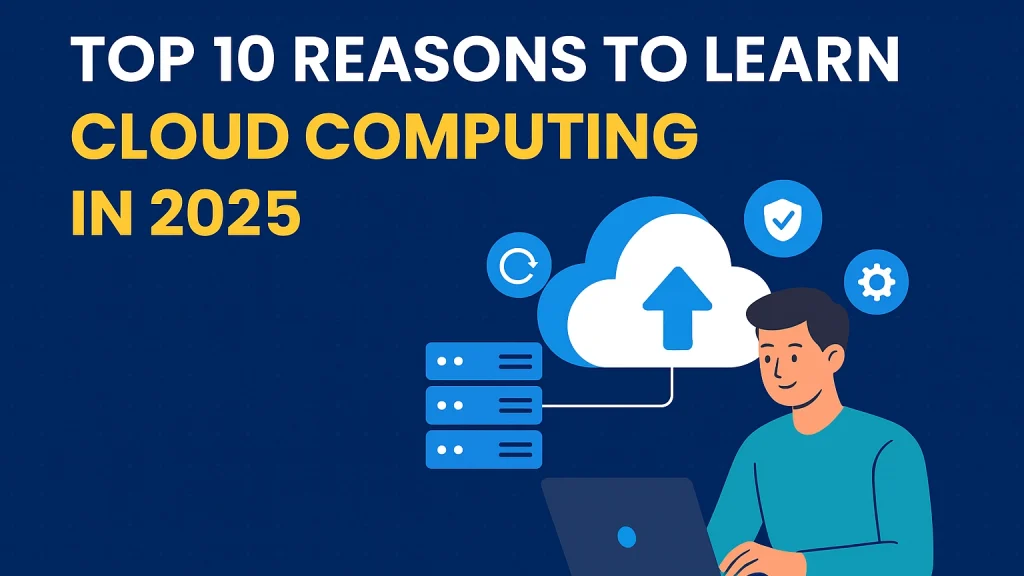Cloud computing now underpins how modern products launch, scale, and stay secure. Teams expect faster delivery, predictable costs, and resilient design—and the cloud is where those goals meet.
If you’re aiming for tangible career momentum in 2025, the right program should sharpen hands-on skills, map choices to business outcomes, and help you communicate trade-offs clearly. The seven options below prioritize practical learning, evaluated work, and portfolio-ready outputs.
Factors to Consider Before Choosing a Cloud Computing Course
- Career objective: Architect, DevOps, SRE, platform engineer, or cloud PM—pick a path and match the program depth accordingly.
- Baseline skills: Verify prerequisites (Linux, networking, scripting, IaC).
- Learning mode: Self-paced vs cohort; mentorship and feedback cadence matter.
- Hands-on rigor: Real labs, multi-cloud exposure, graded projects, capstone.
- Certification signal: Recognized certificates or exam prep that hiring managers value.
- Tooling stack: IaC (Terraform), pipelines (CI/CD), containers (Docker/Kubernetes), observability.
- ROI: Placement support, alumni network, and portfolio artifacts.
Top Cloud Computing Courses to Launch Your Career in 2025
1) Google Cloud Professional Architect Path — Coursera (Google Cloud)
Duration: 3–6 months (self-paced)
Mode: Online
Short overview: A role-aligned path preparing you for the Professional Cloud Architect exam. You’ll design secure, compliant, and cost-aware architectures on GCP, practice with labs, and complete case-based scenarios that mirror real stakeholder asks and trade-off decisions.
What sets it apart (certificates):
Official exam alignment, extensive Qwiklabs/Skill Boosts labs, a clear competency map from design to operations, a certificate of completion, plus exam readiness.
Curriculum/Modules:
Cloud architecture principles; IAM and security; networking/VPC; compute/storage/databases; SRE and reliability; cost controls; landing zone patterns; case studies.
Ideal for:
Engineers and architects are moving into GCP leadership roles, while consultants are designing greenfield or migration projects.
2) Post Graduate Program in Cloud Computing — Great Learning
Duration: ~6–11 months (mentored)
Mode: Online, cohort with guidance
Short overview:
A practitioner-oriented program spanning AWS, Azure, and GCP with capstone delivery. Mentorship, labs, and structured career support help you translate architecture patterns, DevOps, and security fundamentals from a cloud computing course into portfolio artifacts recruiters can quickly evaluate.
What sets it apart:
Shareable program certificate, multi-cloud labs, capstone reviewed by mentors, and career services.
Curriculum/Modules:
Linux/networking basics; AWS/Azure/GCP services; IaC with Terraform; CI/CD pipelines; containers & Kubernetes; monitoring/observability; security, compliance, and cost optimization; capstone.
Ideal for:
Developers/analysts transitioning to cloud roles; professionals seeking structured mentorship and multi-cloud breadth.
3) AWS Solutions Architect (Associate) Prep — Udemy/A /A Cloud Guru
Duration: 6–10 weeks (self-paced)
Mode: Online
Short overview:
Tightly focused prep for the AWS SAA-C03 exam with scenario-driven lectures and practice tests. Emphasis on designing resilient, cost-optimized architectures and understanding service limits, patterns, and failure domains through hands-on labs.
What sets it apart (certificates):
Course completion certificate plus structured readiness for a widely recognized AWS certification.
Curriculum/Modules:
Core AWS services; high availability; networking; storage and databases; security/IAM; logging/monitoring; Well-Architected patterns; exam scenarios.
Ideal for:
Engineers targeting their first cloud architect credential on AWS.
4) IBM Cloud Professional Developer — edX (IBM)
Duration: 3–5 months
Mode: Online
Short overview:
Developer-centric track covering app deployment on managed services, DevSecOps, and event-driven integrations. You’ll implement microservices, secure pipelines, and observability patterns while practicing vendor-neutral skills transferrable across providers.
What sets it apart:
Verified edX certificate, IBM digital badges, practical labs using real cloud tooling.
Curriculum/Modules:
Cloud-native fundamentals; containers/K8S; CI/CD and GitOps; APIs and messaging; security basics; monitoring and logs; sample microservice project.
Ideal for:
Developers moving to cloud-native delivery with an emphasis on build-and-run ownership.
5) Cloud Computing: Strategy, Technology, and Management —The University of Texas at Austin
Duration: 6–8 weeks
Mode: Online
Short overview:
An executive-level course that connects cloud choices to business outcomes governance, risk, cost, and operating models. Designed to help leaders evaluate vendors, set guardrails, and guide modernization without drowning in implementation detail the ideal pg program in cloud computing for decision-makers.
What sets it apart:
Shareable completion certificate, executive case work, templates for TCO/ROI, and governance.
Curriculum/Modules:
Cloud economics and FinOps; security and compliance; operating models; vendor selection; migration playbooks; risk and resilience; board-ready narratives.
Ideal for:
Managers and senior leaders align cloud decisions with strategy and measurable outcomes.
6) Kubernetes for Cloud-Native Engineering — Linux Foundation (LF)
Duration: 6–10 weeks
Mode: Online
Short overview:
Deep dive into container orchestration with hands-on labs that mirror production ops. You’ll learn cluster setup, workloads, networking, storage, and security—plus the foundations needed for CKA/CKAD certification pathways.
What sets it apart:
Verified completion and direct preparation for industry-respected CNCF certifications.
Curriculum/Modules:
Pods, deployments, services/ingress; storage and state; RBAC and policies; observability; Helm; troubleshooting; cluster lifecycle.
Ideal for:
Engineers owning microservices in production and teams standardizing on Kubernetes.
7) Azure Administrator/Architect Path — Microsoft Learn (with Labs)
Duration: 2–4 months (modular)
Mode: Online
Short overview:
Role-based pathway that builds from AZ-104 administration to architecture skills. Labs and sandboxes reinforce identity, networking, storage, governance, and resilience—strong preparation for AZ-104/AZ-305 certifications and real-world Azure ownership.
What sets it apart:
Module badges, official completion records, and direct alignment with Microsoft certifications.
Curriculum/Modules:
Azure identity and access; VNets and hybrid networking; storage/compute; backup and DR; policies/Blueprints; cost governance; reference architectures.
Ideal for:
Admins and engineers standardizing workloads on Azure or managing hybrid estates.
Conclusion
Cloud learning, and the right cloud computing courses, works best when it is measurable. Choose a path, schedule weekly study blocks, and ship small proofs: pipelines, IaC, and dashboards that demonstrate value. That habit compounds faster than any single module.
As you progress through cloud computing courses, tighten your feedback loop by attempting the aligned certification, refining cost and security guardrails, and scaling your portfolio with a capstone that mirrors a real migration or modernization. Consistency and clear artifacts will move your career forward.

